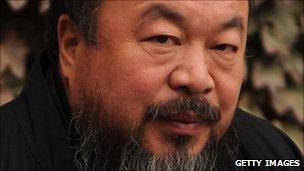China artist Ai Weiwei served with $2m tax demand
- Published

Ai Weiwei spent almost three months in detention, but was never arrested
Chinese authorities have served Ai Weiwei with an official demand telling him to pay 15m yuan ($2.3m; £1.4m) within 15 days, the artist has said.
He said he had rejected the notice, and was not sure whether he would pay.
The artist, one of China's most famous people, was held for almost three months earlier this year before being accused of "economic crimes".
His supporters say the accusations are part of a plot to silence Mr Ai, who is an outspoken critic of the government.
Mr Ai said he would pay the money if it was proved to be a tax issue.
But he said he had not been able to review his company's account books because they had been taken by the authorities.
And he said he had not seen any evidence showing that the firm had evaded tax.
Ai Weiwei: "Why don't they behave themselves to make the process more transparent?"
"I am only a designer of the company. I never signed any of the company's contracts, nor did I ever read any of the company's finance reports, so I have no idea," he told the BBC.
Mr Ai was picked up by police in April as authorities rounded-up activists, following calls on websites for a Middle Eastern-style Jasmine revolution in China.
The state news agency Xinhua said in June that Mr Ai had been released "because of his good attitude in confessing" to tax evasion and because he had agreed to pay back the money he owed.
But on Tuesday he said: "It was not true that I admitted to tax evasion charges. I was never formally arrested and never charged."
"If they really want to prove that I am a bad guy, why don't they behave themselves to make the process more transparent?" he later added.
Since his incarceration, he has won numerous art awards, and was recently named the world's most powerful artist in a poll carried out by an art magazine.
His case has also become a cause celebre for rights activists and critics of China's Communist Party.
- Published13 October 2011
- Published29 June 2011
- Published20 July 2012